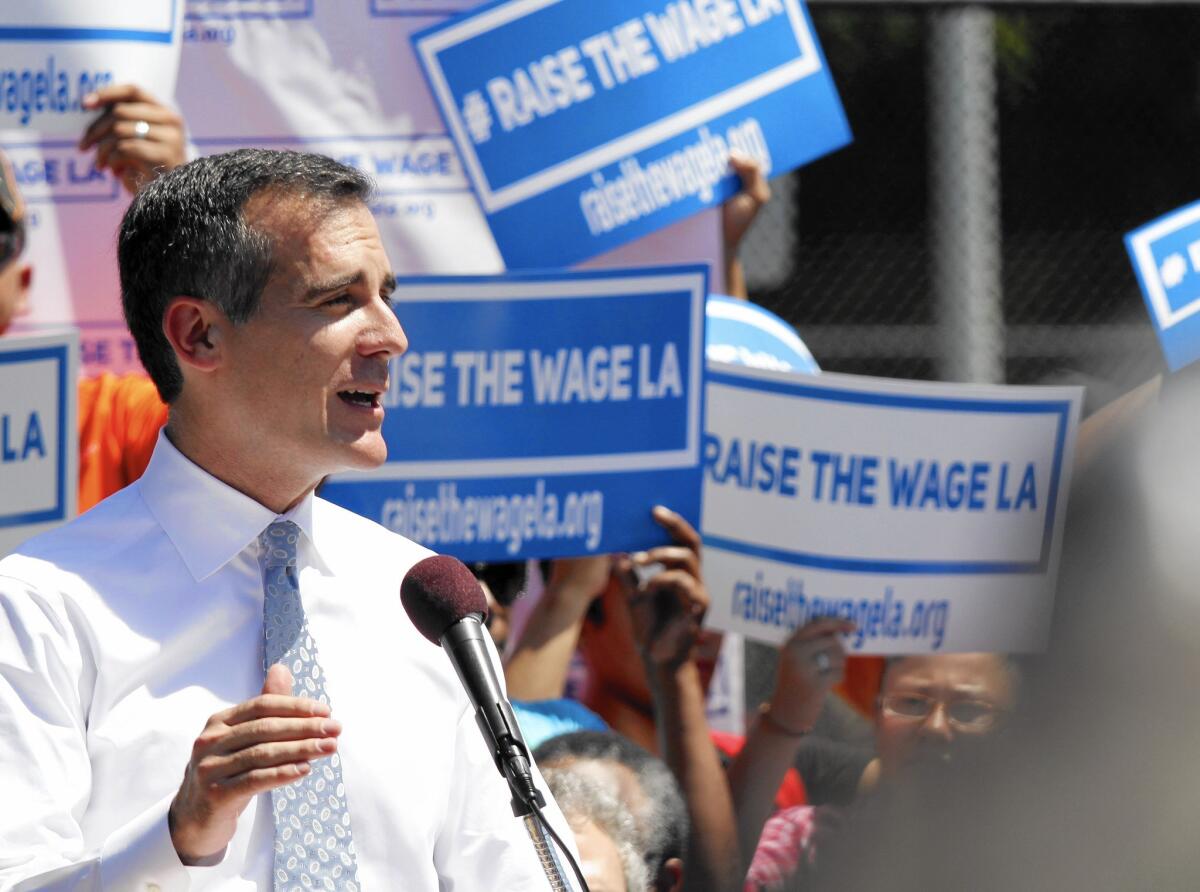L.A. wage hikes spark fierce debate

Los Angeles has thrust itself into the center of one of the most contentious debates in modern economics — what happens when you raise the minimum wage? — as city leaders consider mandating $13.25 an hour.
Since their inception in the Great Depression, minimum wage laws have prompted a fierce debate about unintended consequences: Do wage hikes force businesses to lay off workers? Do they effectively address poverty? Will consumer prices rise? Will business flee to lower-wage cities?
In Los Angeles, the stakes are especially high. Because of its large population of low-wage earners, the proposed wage increase would affect far more people — 567,000 — than in any other major city considering such a measure, according to research from UC Berkeley.
Mayor Eric Garcetti has said he wants the City Council to vote on the wage hike by January.
The city’s geography poses a challenge, however. About two dozen other municipalities adjoin Los Angeles, raising the prospect that businesses might move outside the city limits to avoid higher labor costs.
Garcetti and supporters say the measure would provide an economic boost, not a burden, by giving new spending power to a broad swath of the city workers.
“The economic cost of having so many low-wage workers is untenable for our city,” Garcetti said. “We don’t have the spending and buying power that we need to see here.”
While Garcetti’s proposal is not the highest in the country — Seattle earlier this year approved a $15 minimum wage that will begin in 2017 — it is larger than most proposals that have been studied in-depth.
Several Los Angeles City Council members are pushing for the wage to rise even more, to $15.25, by 2019.
In decades of political debate over the minimum wage, ideological zeal has often crowded out more sober policy analysis.
But economists and researchers have found a few key points of consensus on the crucial questions.
Will workers lose their jobs?
The biggest fight over the minimum wage surrounds the notion that higher wages will force businesses to lay off workers. Traditional economic theory suggested businesses would have no choice but to cut costs to preserve profits.
But since the 1990s, two distinct camps of economists have staked claims around the minimum wage. Both sides have one conclusion in common: The effect on jobs is small. The question is: How small?
One group, which includes researchers at UC Berkeley, contends that minimum wage increases cause hardly any job losses. Businesses absorb higher labor costs, they argue, through reduced turnover, greater employee productivity and some price increases passed on to consumers.
“The low-wage labor market doesn’t only operate on the principles of supply and demand,” said Arindrajit Dube, an associate professor of economics at the University of Massachusetts in Amherst . “There’s a possibility of increasing wages, killing vacancies and reducing turnover, rather than killing jobs.”
Others such as David Neumark, director of the Center for Economics & Public Policy at UC Irvine, contends the job losses are real, though not devastating.
“We’ve never said they are really big effects, but they are there,” Neumark said. “Some people win and some people lose.”
Neumark’s research, focusing on teenagers, has pointed to job losses of 1% to 2% for every 10% increase in the minimum wage. In the case of Los Angeles’ minimum wage increase, that would equate to job losses of 3% to 6% for teenagers.
But Neumark cautioned that the effects could be even larger, since the existing research has not focused on wage increases as large as the one proposed in Los Angeles.
A 2013 University of Chicago survey of top economists found nearly half agreed that job losses were “sufficiently small” compared with the benefits for lower-skilled workers. Only 11% disagreed; 32% were uncertain.
The Congressional Budget Office predicted this year that raising the federal minimum wage to $10.10 an hour by 2016 would reduce total U.S. employment by about 500,000 workers — just 0.3% of the overall workforce. But about 16.5 million workers would make more money, and 900,000 would be lifted above the poverty line.
Will a higher minimum wage help the poor?
Not all minimum wage workers are poor. Many are teenagers in affluent families, spouses married to higher-earning breadwinners, or part-time workers with other income.
So are minimum wage hikes effective in targeting poverty? Would other policies help the poor more, with fewer economic side effects?
The CBO study found that only about 20% of the increased earnings from a federal wage hike would go to families below the federal poverty threshold ($18,700 for a family of three). Nearly 30% would go to families making more than three times that amount — more than $56,000 for a three-person household).
Neumark, whose studies have found that wage hikes produce job losses, argues that wage policy is misdirected.
“It doesn’t do a good job of addressing the problem we’re trying to solve, which is not low wages, but low family income,” he said. “It’s a very inefficient way to target the poor, because it doesn’t target the poor.”
His research has shown that increasing the minimum wage has virtually no effect on poverty, because any benefits would be negated by the workers who would lose jobs after a wage hike.
More recent research, however, has found wage hikes do in fact reduce poverty. A study late last year by Dube of UMass in Amherst found that a 10% increase in the minimum wage could reduce the federal poverty rate more than 2%.
But many experts believe there are more effective anti-poverty policies, such as the earned income tax credit — a subsidy available only to lower-income working families.
Minimum wage supporters say both policies are needed. The tax credit encourages low-income people to enter the workforce, they argue, and higher wages lift them from poverty.
Will prices rise?
Less studied is how a minimum wage hike affects consumers — including the workers who get raises.
Economists say price changes would be most noticeable in the restaurant industry, which employs far more low-income workers than other sectors. Restaurant balance sheets are tight, with payroll gobbling up roughly a third of sales on average. Most economists agree that menu prices will rise, especially at fast-food restaurants.
A National Restaurant Assn. survey of 1,300 restaurant operators found that 58% increased prices after the federal minimum wage swung to $5.85 from $5.15 in 2007.
A 2007 study by Michael Reich of UC Berkeley and other economists concluded that restaurant prices in San Francisco rose 2.8% more than those in neighboring Alameda County after the city increased its minimum wage 26% in the mid-2000s. At fast-food restaurants, prices were 6.2% higher.
That translates to a 31-cent increase on a $5 cheeseburger.
Economists Dale Belman and Paul J. Wolfson surveyed seven studies that looked at industries with a high concentration of minimum-wage workers. They concluded that all showed signs of rising prices in reaction to minimum wage hikes, according their book this year from the W.E. Upjohn Institute for Employment Research.
But to date, research has found only slight price increases at restaurants — and almost no sign of changes in other industries.
Daniel Aaronson, in an oft-cited 2001 study, wrote that fast food outlets implement a one-time price increase within a month or two of a higher minimum wage being enacted — roughly 0.7% for a 10% wage boost.
“People aren’t going to switch their shopping behavior for that,” said Aaronson, now director of microeconomic research for the Federal Reserve Bank of Chicago.
The wage hike proposed for Los Angeles, however, could be far larger — as much as a 69% jump if a more ambitious push for $15.25 an hour succeeds. And Los Angeles has far more low-wage workers than other cities, including San Francisco and Seattle, that have raised wages.
“These are way bigger changes than we’ve ever seen before,” said Aaronson of the Federal Reserve Bank of Chicago. “Maybe everything’s out the door. We just don’t know from past experience what would happen.”
Will businesses and workers leave L.A.?
It seems like a logical conclusion that many businesses faced with a law that eats into their profits would just move to a new city or state with different laws — especially businesses near a border.
“Businesses just outside the borders can charge much lower prices,” said Michael R. Strain, a resident scholar at the conservative American Enterprise Institute. “That really hurts the very people you’re trying to help.”
But there’s little evidence that businesses have fled higher-wage areas. Detailed research on the topic is sparse.
Aaronson studied restaurants, and reported that businesses leaving in response to wage hikes were partly offset by incoming businesses.
Companies who can operate remotely from their customers — such as administrative agencies and professional firms — may also jump ship, economists said. But restaurants, grocery stores, day care centers and other businesses that need to be close to their clientele will likely stay put.
“It may just be a wash in terms of the greater Los Angeles labor market,” Dube said. “It’s not a net loss in any real economic sense.”
But the city is also unique in that it shares a border with dozens of other municipalities. Some, such as Santa Monica and West Hollywood, are also considering minimum wage increases. But none of the other proposals call for wages as high as those proposed for Los Angeles.
Los Angeles is already an expensive place to do business, but the city remains a commercial hub, drawing companies with its proximity to the ports, diverse population, steady weather and other attractions.
Business could also see important benefit to offset the higher costs — more applicants to choose from.
It’s simple math: Business that pay more attract more and better workers, said Marieka Klawitter, a public affairs professor at the University of Washington who has researched low-wage workers in Seattle.
“It’s going to be worthwhile for them to travel 10 or 15 miles,” she said, “to get to a job where they can earn $6 more an hour.”








